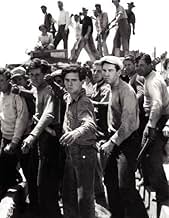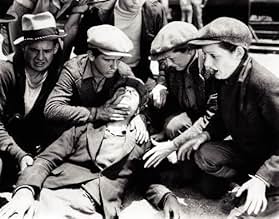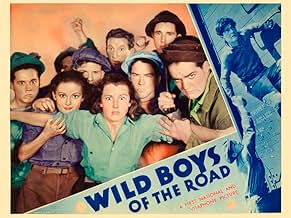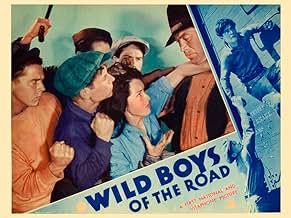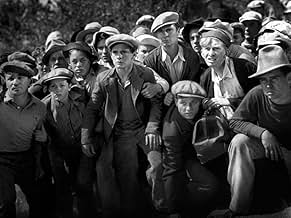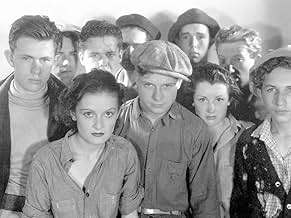Adicionar um enredo no seu idiomaIn the depths of the Depression, two teenage boys strike out on their own in order to help their struggling parents and find life on the road tougher than expected.In the depths of the Depression, two teenage boys strike out on their own in order to help their struggling parents and find life on the road tougher than expected.In the depths of the Depression, two teenage boys strike out on their own in order to help their struggling parents and find life on the road tougher than expected.
- Direção
- Roteiristas
- Artistas
- Prêmios
- 1 vitória no total
- Sally
- (as Dorothy Coonan)
- Boy
- (não creditado)
- Police Sergeant
- (não creditado)
- Policeman in Court
- (não creditado)
- Brakeman Throwing Stones
- (não creditado)
- Youth in Line-up
- (não creditado)
Avaliações em destaque
*** 1/2 (out of 4)
William A. Wellman directs this Depression era drama about two boys (Frankie Darro, Edwin Phillips) who run away from home and jump on the railroad route in hopes of finding a job so that they can help their families back home. Once again there must have been something inside of Wellman because there's a lot of passion in this film aimed at the poor who must do what they can to try and survive. This is a very hard hitting film that looks at this kids in a very serious light and it makes for a terrific little gem that deserves more attention than it's gotten within film history. Both Darro and Phillips are terrific in their roles and the chemistry they offer is great. Wellman's future wife, Dorothy Coonan, is also very good in her role as the boys buddy. The first twenty-minutes of the film shows the boys as normal teenagers but then we see their parents lose their jobs and thus forcing them to hit the road. This set up really sells the rest of the film and it also helps us see the suffering they're going to go through for the rest of the film. Wellman does a great job with the tender side of the story as well as a couple great fight sequences where they boys attack some railroad police as well as a rapist. Darro has a bit of Cagney in him and his performance here seems to have had a major influence on what we'd eventually see from The Dead End Kids.
Frankie Darro and Edwin Phillips portray the juvenile leads Eddie and Tommy, with Darro's performance effective and appealing. Their characters indulge in the usual teenage shenanigans until the depression overtakes their parents. As times toughen, and Eddie's father can't find work, Eddie decides to sell his jalopy to help out. This sets up the first of many splendid scenes, as Eddie's tough-guy veneer drops just long enough to share raw emotions with his father (Grant Mitchell). Zero cringe factor here, Wellman excels at emotions between men and it's never maudlin.
Hitting the (rail)road to find work, Eddie and Tommy encounter Sally, an adorable, nose-scrintching Dorothy Coonan dressed as a man. And the three set off across the country, with high ideals and optimism clashing with depression realities. Brutal and raw, this is a journey you, too, must take. A page of America's history told so expertly as to make you laugh and cry simultaneously.
Ms. Coonan (Sally) quit films after "Wild Boys" to marry director "Wild" Bill Wellman, and remain his his wife until his death in 1975. My highest recommendation.
With their east coast (New "Yawk?") accents, and rough around the edges "Bowery Boys"-style (harken, Leo Gorcey!), Frankie Darrow and a gang of displaced down-on-their-luck (formerly middle class?) teens band together and roam the countryside on foot or by rail, getting into hot water seemingly everywhere they go. Amazing graphic scenes for 1933 include a kid's leg being amputated by a train and an attempted rape scene.
Miserable living conditions and hunger are also depicted with kids lying cheating and stealing to stay alive, but willing to straighten themselves out when given a chance.
You'd think Warner Brothers was taking a risk financing a film that was so bleak and lacking in entertainment value for people that may have been LIVING the kinds of scenes shown, but the film also seems like a propaganda piece for Roosevelt's New Deal. There's a Roosevelt look-alike judge who places his hand, almost in a blessing, on poor Frankie's head and says "things are going to get better very soon".
Overall, Wild Boys of the Road is an interesting social drama that deserves more exposure and recognition.
Você sabia?
- CuriosidadesThe movie shown in the movie theater scene (about an hour into the film) is another Warner Bros. release, Belezas em Revista (1933).
- Erros de gravaçãoThere are no mountains in Columbus, Ohio.
- Citações
Eddie: [to the judge] I knew all that stuff about you helping us was baloney. I'll tell you why we can't go home: because our folks are poor. They can't get jobs and there isn't enough to eat. What good will it do you to send us home to starve? You say you've got to send us to jail to keep us off the streets. Well, that's a lie. You're sending us to jail because you don't want to see us. You want to forget us. But you can't do it because I'm not the only one. There's thousands just like me, and there's more hitting the road every day.
Tommy: [also to the judge] You read in the papers about giving people help. The banks get it. The soldiers get it. The breweries get it. And they're always yelling about giving it to the farmers. What about us? We're kids!
- ConexõesFeatured in Alibi Mark (1937)
- Trilhas sonorasThe Gold Diggers' Song (We're in the Money)
(uncredited)
Music by Harry Warren
[Played after the kids leave the dance; also whistled by Eddie (Frankie Darro)]
Principais escolhas
- How long is Wild Boys of the Road?Fornecido pela Alexa
Detalhes
- Data de lançamento
- País de origem
- Idioma
- Também conhecido como
- Wild Boys of the Road
- Locações de filme
- Southern Pacific Taylor Yard, Glendale, Califórnia, EUA(train yard sequence)
- Empresa de produção
- Consulte mais créditos da empresa na IMDbPro
- Tempo de duração
- 1 h 8 min(68 min)
- Cor
- Mixagem de som
- Proporção
- 1.37 : 1


